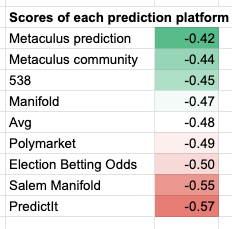This market resolves to YES if, after the 2022 midterm elections for the U.S. Senate, members of the Democratic party are set to control a majority of seats in the Senate for the 2023-2024 period (or 50% of seats and the Vice Presidency). If I decide that the number of seats won by Democrats is ambiguous as of the resolution date, the market resolves to N/A. Mar 6, 5:20pm: I'm noticing now that there's a bit of ambiguity between my title and the description - There are actually currently 2 seats held by independent senators who caucus with the Democrats. Despite this, the consensus online seems to be that the democrats control the Senate currently, so I'm going to clarify that these senators (Bernie Sanders and Angus King, neither up for reelection in 2022), count as democrats for the purposes of this market.
Close date updated to 2023-01-01 11:59 pm
🏅 Top traders
| # | Name | Total profit |
|---|---|---|
| 1 | Ṁ1,480 | |
| 2 | Ṁ1,098 | |
| 3 | Ṁ806 | |
| 4 | Ṁ709 | |
| 5 | Ṁ653 |
People are also trading
@Sjlver ... although it depends on whether you count just the 35 seats that were up for re-election, or look at all the 100 seats. In the former case, since there are 19/35 republican seats, republicans probably did get more votes.
Democrats will keep control of the Senate, CNN projects, after victories in close contests in Nevada and Arizona.
So seems like polls and 538 were pretty much correct. And everybody else was wrong? (538 polls only model was 50/50, "classic" model that incorporates fundamentals was 51/49 for GOP, and "deluxe" model that incorporates expert opinion was 59/41 for GOP). So seems that we should be relying on polls more despite past issues. Does this mean they successfully compensated for non-response bias?
Yeah, 538 did very well here. However, Metaculus actually is the big winner so far in the comparison I've been running: https://manifold.markets/post/comparing-election-forecast-accurac
This is a snapshot of the current scores using the prediction market probabilities for the races that haven't been called yet - scores will change as the results come in.

These are log scores: green (closer to 0) means more accurate, red (more negative) means less accurate
For comparison: predicting 50% for everything gets log score -0.69
Posted updated results and analysis here: https://firstsigma.substack.com/p/midterm-elections-forecast-comparison
@DavidDavidson I'd be shocked if the market resolved before then, and very surprised if the date wasn't extended.
@DavidDavidson I buy @notmachine 's argument here. It wasn't what I intended, but the criterion explicitly says "If I decide that the number of seats won by Democrats is ambiguous as of the resolution date, the market resolves to N/A." I'm not sure I can justify not resolving N/A in this scenario.
@NcyRocks Feels a little bad to change the resolution date when the market description makes reference to it, no?
@BoltonBailey You refer to the resolution date, not the close date. Again, it seems obvious to me that the resolution date is (in a runoff scenario) whenever the runoff results come in.
@NcyRocks Indeed this market was made several months ago, when Close date and Resolution date were different things. I wonder if it was different for this market?
It's also hard for me to say if anyone would really care if I extended the market. Would anyone be screwed over by that? Maybe someone who bet on this market assuming there was a high chance of the runoff condition and used it to arb something else? Not sure anyone is really doing something so nuanced.